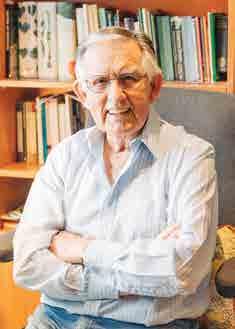Denis Bratton Denis Bratton was born in 1936. He is from Armagh City.
Well, I was born in Northern Ireland [in] 1936. I lived there up until I was 17 years of age. I lived a normal life in Northern Ireland. We were a big family, four boys and a girl. And my father was in the British Army in the First World War and the Second World War, and then my mother was in Cumann Na mBann too, at the same time as him. I went to a Christian Brothers school, and got that Northern Ireland Senior Leaving Certificate. When I left grammar school, the only tertiary education you could get into was, say, teaching. And there was a Catholic teaching college, Trench House in Belfast, and the Protestant one, a state one. And you need to be a Rhodes Scholar to get into those. I don’t know, if I’d stayed in Ireland, I don’t know what I would have done. Couldn’t get much of a job in Northern Ireland. I applied for jobs when I left school, no good. What, 27%, 28% unemployment, you know. And that was only the Catholics, couldn’t think of any Protestants unemployed. My two brothers went into the British Army. And my sister, she actually went to Belfast to work in the civil service. She was lucky. But you saw your friends and neighbours, and their sons and daughters going to England for work. I fancied being an architect, because I was good at art and drawing maps and that sort of thing. But couldn’t get a job because even then, you heard about the old tale of, ‘No cats, no dogs, no Irish need apply’. Well, in the Belfast papers some of the adverts for jobs were, ‘No Irish need apply’. And the problem was that if you went for a job, in a small city like Armagh, everybody knew who you were anyway. And then in Belfast, if you went for a job in Belfast, my name was Bratton. And that’s a Protestant name, because my father was a Presbyterian. He changed his religion to marry my mother. My father was a Plantation person, my mother wasn’t. [Her name was] Tomney. So anyway, when I went for jobs in Belfast, got interviews for architect’s office and showed them my drawings and artwork, and they loved that. They thought I was a Protestant. So, my name being Bratton, I got past the first five or six interviews okay. 66 | THE IRISH SCENE
And of course, the crunch came, when they turn around and say, ‘What school did you go to?’ I went to a Christian Brothers school. So I just left. I had an uncle, my father’s brother. He was a master mariner and I hadn’t seen him very much because he lived in India. He came over on holiday one time and said, ‘Why don’t you join the Merchant Navy? You’re a bit old for a cadet, and too well educated, I can get you in as a cadet.’ So I went into the Merchant Navy as a cadet. Stuck it out for about two years. They offered to let me sit early for my second officer’s ticket, which they don’t normally do. But I said no, I just wanted to leave. So they let me go. When I left sea, I went back to Ireland and I was on the dole for about six weeks. You went down to the dole and they would offer you a job, what, in a mushroom planting factory in Birmingham. I was fed up with it so I applied for the Ordnance Survey in England. I had to go over there for the interview. They paid my fare. They were just about to do a whole, complete re-survey and they were wanting people. When I was fed up with moving around in the field, I left the Ordnance Survey in England and joined [a survey company] in Coleraine, where you do survey work, and mapping. You couldn’t call it a factory, but it was a factory, churning out maps. The thing was when we were living in Coleraine, we couldn’t afford























